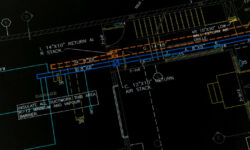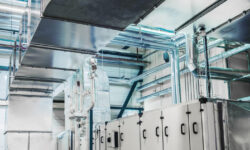The best way to avoid HVAC building maintenance problems is to schedule a seasonal inspection and tune-up. This type of routine service will help keep your commercial system running efficiently all year round. It will also give the HVAC technician an opportunity to identify problems earlier, which will make it easier to conduct repairs. It’s also important to keep aware of developing problems. Here are a few common commercial HVAC issues to look for throughout the year.
Read more →As a commercial HVAC contractor, we focus solely on servicing the heating and cooling systems for businesses and industrial businesses. This allows us to ensure each of our technicians has the specialized experience and skills necessary to work with larger cooling systems. Read on to discover some of the reasons we focus on commercial HVAC equipment.
Read more →Anyone who owns a commercial building knows that ductwork is an integral part of the property’s operations. In order to operate at maximum efficiency, your HVAC ductwork needs to be designed, sized, and installed correctly. Proper duct size is all too often an overlooked feature of commercial HVAC systems. The role that duct sizing and material play in maintaining a safe, comfortable environment should not be underestimated. Having the right size and material for your ducts will maintain comfortable conditions, improve indoor air quality, minimize energy losses, and lower your heating and cooling bills, as well.
Read more →Commercial HVAC systems account for as much as 39% of energy use in commercial buildings throughout the country. That number, 39%, represents an opportunity to save money while maintaining comfort and operational efficiency. By designing a commercial HVAC system correctly from the start, you will have the best chance at saving on operational costs without taking shortcuts.
Read more →As winter comes around, there will be numerous things to do to prepare your commercial building. Getting your HVAC systems ready is one of them, and going with the professionals can help you in more ways than you might think.
Read more →Air handling units (AHU) are used in medium- and large-sized industrial or commercial properties to condition and distribute fresh air throughout the building. An AHU is part of the larger HVAC system (heating, ventilating, and air conditioning). The device takes air from the outdoors, cleans and conditions it, and heats or cools it as needed. Read on to learn more.
Read more →It may come as no surprise to learn that the HVAC system is the largest source of energy use in your building. Wouldn’t it be great to decrease your utility costs without sacrificing the quality of your indoor air? A smart HVAC system may be the solution. Smart systems are more efficient and can reduce energy use up to 10-15%. With savings like that, you could recoup the cost of installing a smart unit in just a few years.
Read more →As stated by the CDC, HVAC systems can be a big source of indoor pollutants. Improperly maintained systems can lead to the introduction of microbes into an indoor air system. Improper operation and maintenance of HVAC systems can seriously impact a building’s indoor environmental quality (IEQ) and be the cause of other detrimental issues. A Severn Group service contract is a cost-efficient, convenient way to ensure a building’s HVAC system is properly maintained. The following five reasons explain why a service contract is the right choice.
Read more →Where are the savings? That’s the theme of the building industry in this post-pandemic era. Many raw materials have increased in price, and construction budgets for commercial and residential high-rises are skyrocketing. This makes it more important than ever to know where the those savings are. These savings sometimes come from the least expected places. One of them is the 179D Energy Tax Deduction. This allows tax savings for measures that increase energy efficiency in buildings through the HVAC system. The 179D Energy Tax Deduction is also known as EPAct. It applies to commercial buildings, and multi-family residential buildings that are four stories or higher (above ground). Owners can expense up to $1.80 per square foot of the cost of improvements that increase energy efficiency.
Read more →Getting rid of dust is a constant problem for all commercial properties. To ensure acceptable air quality and cleanliness for your properties, you need to institute a detailed dust prevention and removal routine. It’s easy enough to do when you remove dust regularly.
Read more →









